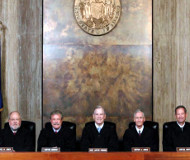Article from: www.thenewspaper.com/news/49/4944.asp
4/22/2016
Idaho Supreme Court Scales Back DUI Law
Idaho Supreme Court rules that implied consent law does not revoke the right of a motorist to refuse a blood test.
 The Idaho Supreme Court earlier this month rejected the police practice of forcibly drawing blood from motorists suspected of driving under the influence of alcohol (DUI). In a 4 to 1 decision, the justices agreed that a local sheriff's deputy should not have forced a blood test on Brant Lee Eversole after his April 16, 2011 arrest.
The Idaho Supreme Court earlier this month rejected the police practice of forcibly drawing blood from motorists suspected of driving under the influence of alcohol (DUI). In a 4 to 1 decision, the justices agreed that a local sheriff's deputy should not have forced a blood test on Brant Lee Eversole after his April 16, 2011 arrest.
The deputy happened upon Eversole's truck which was high-sided on a brick berm with the drive wheels lifted off the pavement. Two men were making a futile attempt to free the vehicle while Eversole waited behind the wheel.
Eversole was clearly drunk, smelling of alcohol, so the deputy asked him to take sobriety tests. After failing a few, he refused to take any more. Eversole was arrested and taken to Bingham Memorial Hospital where his blood was removed and the blood alcohol content measured at .27, or triple the legal limit.
Eversole was convicted, but he appealed, winning last year before the state Court of Appeals (view ruling). Then it was the prosecutors who appealed, asking the high court justices to re-instate the ability of police to draw blood from motorists by force. They cited Idaho's implied consent law, which states that all motorists agree to be tested in the event that they are pulled over and accused of drunk driving.
The high court refused to accept this interpretation, insisting that the Fourth Amendment requires the use of a warrant for such a search. The US Supreme Court's ruling in McNeely (view opinion) rejected the view that there were any blanket exceptions to obtaining a warrant that applies to all DUI cases. The Idaho justices applied this understanding to the state's implied consent statute and found that it could not be considered an exception to the requirement to obtain a warrant.
"Because Eversole's implied consent to evidentiary testing for alcohol concentration already had been revoked, the consent exception to the warrant requirement was inapplicable, unless the state proved by a preponderance of the evidence some subsequent action or statement Eversole made within a reasonable time renewing his consent to evidentiary testing," the Supreme Court majority ruled. "The state did not do so. Therefore, the blood draw was an impermissible warrantless search, and the test results must be suppressed."
A copy of the decision is available in a 260k PDF file at the source link below.
Source: Idaho v. Eversole (Idaho Supreme Court, 4/20/2016)
Permanent Link for this item
Return to Front Page
 The Idaho Supreme Court earlier this month rejected the police practice of forcibly drawing blood from motorists suspected of driving under the influence of alcohol (DUI). In a 4 to 1 decision, the justices agreed that a local sheriff's deputy should not have forced a blood test on Brant Lee Eversole after his April 16, 2011 arrest.
The Idaho Supreme Court earlier this month rejected the police practice of forcibly drawing blood from motorists suspected of driving under the influence of alcohol (DUI). In a 4 to 1 decision, the justices agreed that a local sheriff's deputy should not have forced a blood test on Brant Lee Eversole after his April 16, 2011 arrest.